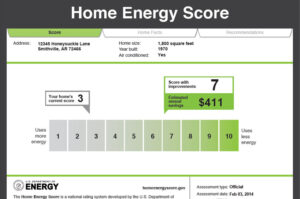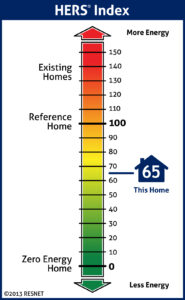What are they?
Home energy scores and ratings provide homeowners, buyers, and renters with comparable and reliable information about a home’s energy use. Home energy scores and ratings look at energy-specific elements of a home to easily compare energy use across the housing market. As the Department of Energy says, it’s “like a miles-per-gallon rating for homes”.
Why do we have them?
Energy efficiency is persistently undervalued in the residential real estate market. Mortgage lenders and underwriters lack data upon which they can base energy efficiency financing, appraisers lack comps for attributing value to energy efficient homes, and energy contractors generally lack data standardization for energy-related upgrade metrics. Homeowners and local governments also often lack awareness about best-fit efficiency upgrades and benefits, and these tools can empower residents and landlords to make cost-effective improvements to their properties.
What’s the value to me?
If you have a particularly energy efficient home, or have recently implemented energy efficiency or renewable energy upgrades through Empower or another program, you can use your score to quantify the value of these upgrades for resale.
A 2018 White Paper from FreddieMac conducted an analysis of energy-efficient homes rated using HES and HERS systems between 2013 and 2017 and found that rated homes are sold for, on average, 2.7% more than comparable unrated homes. The paper also found that better-rated homes are sold for 3-5% more than lesser-rated homes.
If you’re looking to purchase a home, a rated home can help you understand the home’s long-term impact to both your energy bills and your carbon footprint. A highly rated home can also qualify you to borrow more money on your mortgage.
If you have not yet undertaken any energy efficiency or renewable energy upgrades, these ratings can help you better understand where to begin. These ratings can often come with fees however, so if you would like a free home or business energy assessment, be sure to contact San Isabel Electric’s Empower Program at empower@siea.com, siea.com/empower, or by calling 800-279-7432 (SIEA).
Which one do I use?
Two of the most prominent home energy scores in the business are the Department of Energy’s Home Energy Score and the Residential Energy Services Network (RESNET) Home Energy Rating System (HERS).
The Home Energy Score (HES)

Image courtesy of https://signethomeinspections.com/
VIEW A SAMPLE HOME ENERGY SCORE REPORT
Established by the Department of Energy and its national laboratories in 2010, and subsequently updated in 2016, the Home Energy Score Report estimates home energy use, associated costs, and provides energy solutions to cost-effectively improve the home’s efficiency. Each Home Energy Score is shown on a simple one-to-ten scale, where a ten represents the most efficient homes. Homes with a score of 10 are expected to use less energy than 90% of U.S. homes. Homes that score a 5 are expected to use more energy each year than 50% of U.S. homes. A sample of more than 100,000 scored homes reveals an average initial score of 4.7, and a score of 7.3 with recommended improvements.
This rating accounts for home attributes, such as the building’s age, conditioned floor area, and the local climate. It then layers on data about the building envelope – attic, roof, insulation, windows, and foundation. Finally, it assesses equipment that most prominently contribute to your energy bill – HVAC, water heating, and ducts.
In addition to providing a feasible “new score with recommended improvements”, the Home Energy Score Report will give you an estimated annual savings total that is to be expected once the improvements have been made. This helps guide your energy upgrade investment process.
The Home Energy Rating System (HERS)

Image courtesy of https://www.resnet.us/
A group of mortgage industry leaders wanted a better way to measure the financial savings generated by energy-efficient features in a home and to credit that home’s energy efficiency in the mortgage loan. In 1995, representatives of the national mortgage industry, the National Association of State Energy Officials, and Energy Rates Homes of America founded the Residential Energy Services Network, or RESNET. RESNET’s task was to develop national standards for home energy ratings and to create a market for home energy rating systems and energy mortgages.
The HERS was the rating product that emerged from this network. Unlike the HES, the lower the HERS score, the better. The index runs from 0 to 150, and a home with a HERS Index Score of 70 is 30% more energy efficient than a standard new home, while a home with a HERS Index Score of 130 is 30% less energy efficient than a standard new home. A typical resale home scores a 130 on the HERS index, while a while a net zero energy home (or extremely energy efficient home) scores a HERS Index of 0.
To calculate a home’s HERS Index Score, the HERS Rater conducts an energy rating on a home and compares the data against a “reference home” – a designed-model home of the same size and shape as the actual home, so the score is always relative to the size, shape, and type of house being rated. This model home is built to the specifications of the 2006 International Energy Conservation Code, and it always scores a HERS Index of 100.
The HERS score looks at all exterior walls, floors over unconditioned spaces, ceilings and roofs, attics, foundations and crawlspaces, windows and doors, vents and ductwork, HVAC systems, water heating system, and your thermostat.
Today, many builders use a HERS score and report to certify minimum building code compliance with their local or state building authority. To date, more than 2.5 million homes in the U.S. have received HERS scores.
How do I get one?
You can find a list of registered raters on the respective rating websites.
Home Energy Scorer Qualifications:
- hold a relevant credential, such as BPI Building Science Principles, BPI Building Analyst, BPI Envelope, HEP Energy Auditor, HEP Quality Control Inspector
- score an 80% or better on a 20-question written exam about the Home Energy Score
- score an 80% or better on three “Challenge/Practice” homes
- score a 90% or better on two test homes
- be accompanied by a “mentor” during their first home walk-through
Find a Qualified Home Energy Scorer
HERS Rater Qualifications:
- pass the RESNET Core written exam with a score of 80% or higher
- pass the RESNET Practical Simulation exam with a score of 80% or higher on both houses
- pass the RESNET Combustion Safety written exam with a score of 80% or higher
- pass the RESNET Combustion Safety simulation exam with a score of 85% or higher
- complete two home energy ratings – one from blueprints and one from a real home
- join an approved RESNET Quality Assurance Provider
- pay an annual membership fee for rating reviews
- complete a supervised energy rating with a Quality Assurance Designee
- perform two energy ratings for practice
- submit all ratings to QA Provider
- pay a fee for all rating reviews
Find a Qualified Home Energy Rater
Learn More!
Check out the Home Energy Score and Home Energy Rating System websites or contact empower@wordpress-666784-2187745.cloudwaysapps.com. To learn more about energy efficient mortgages, visit the Energy Star Energy Efficient Mortgages page.

Recent Comments